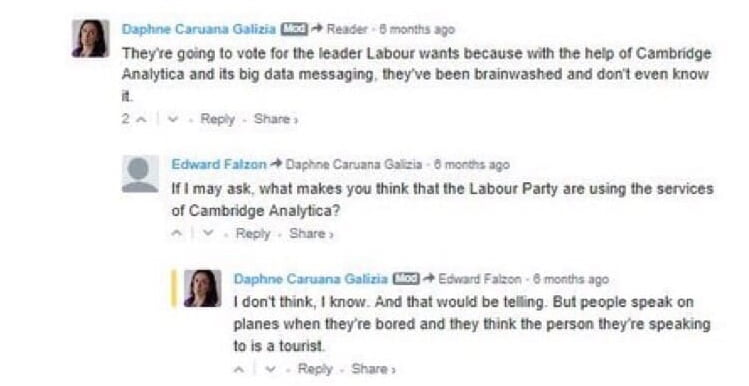The UK Parliamentary Committee for Digital, Culture, Media and Sport has confirmed links there were dealings between SCL Group (the parent organisation of data analytics firm Cambridge Analytica), Henley & Partners chairman Christian Kalin and Labour Party Leader Joseph Muscat prior to the 2013 Maltese elections.
The report, published today, states: “We understand that SCL certainly had meetings in Malta and that Christian Kalin of Henley & Partners was introduced by SCL to Joseph Muscat in 2011, and that Christian Kalin met with both political parties before 2013”.
The now defunct SCL Group was a political consulting and data analysis firm at the centre of a global scandal on election rigging and the manipulation of voters through utilising their private data.
This is the second report on disinformation and fake news published by the UK committee after an interim report last summer. The report published today revealed that following the last one that had referred to the issue in Malta, the Maltese High Commission in London engaged the services of a PR company, Chelgate to deny that there were any links. The new report confirms the links despite the lobbying effort by the High Commission in London.
Henley & Partners moved in to design the controversial cash-for-passports scheme introduced in Malta shortly after the Labour Party came to power in 2013 and remains a concessionaire in a hugely profitable industry. Muscat, now Prime Minister, regularly travels to Henley & Partners conferences around the world to promote the firm’s citizenship-by-investment programmes.
Assassinated journalist Daphne Caruana Galizia had already spoken about the link between Cambridge Analytica, Henley & Partners and Muscat, saying that “almost certainly” Henley & Partners had paid for the services of Cambridge Analytica for the benefit of the Labour Party. Henley & Partners had denied the link.

The full report, entitled ‘Disinformation and Fake News: Final Report’ was ordered by the UK House of Commons in 2017. The committee was tasked with investigating both disinformation and fake news and their affect on democracy.
As well as highlighting links between the Maltese government and the scandal, the report found that Facebook had intentionally broken privacy and competition law on a continual basis and as a result, should be immediately subject to statutory regulation.
Dubbing the social media giants “digital gangsters”, the report alleges that not only did Facebook deliberately obstruct their inquiry, but that they failed to tackle attempts by Russia and other entities into unduly influencing general elections.
“Democracy is at risk from the malicious and relentless targeting of citizens with disinformation and personalised ‘dark adverts’ from unidentifiable sources, delivered through the major social media platforms we use every day,” said committee chairman Damian Collins.
The report also refers to how Cambridge Analytica were able to access the private data of millions of Facebook users that would then be sold on to political clients to help them more effectively manipulate voters.
Facebook is accused of failing to abide by a privacy agreement struck with US regulators in 2011 which directly facilitated the activities of Cambridge Analytica.
Last summer, the Maltese government had reacted to the interim report on fake news by calling it “fake news”, stating that it contained “false and unsubstantiated information” despite the report being based on “ordering people to give evidence and by obtaining documents sealed in another country’s legal system” by the UK parliamentary committee.
In its reaction to the report today, the government denied that there were any links between the Prime Minister and SCL.













